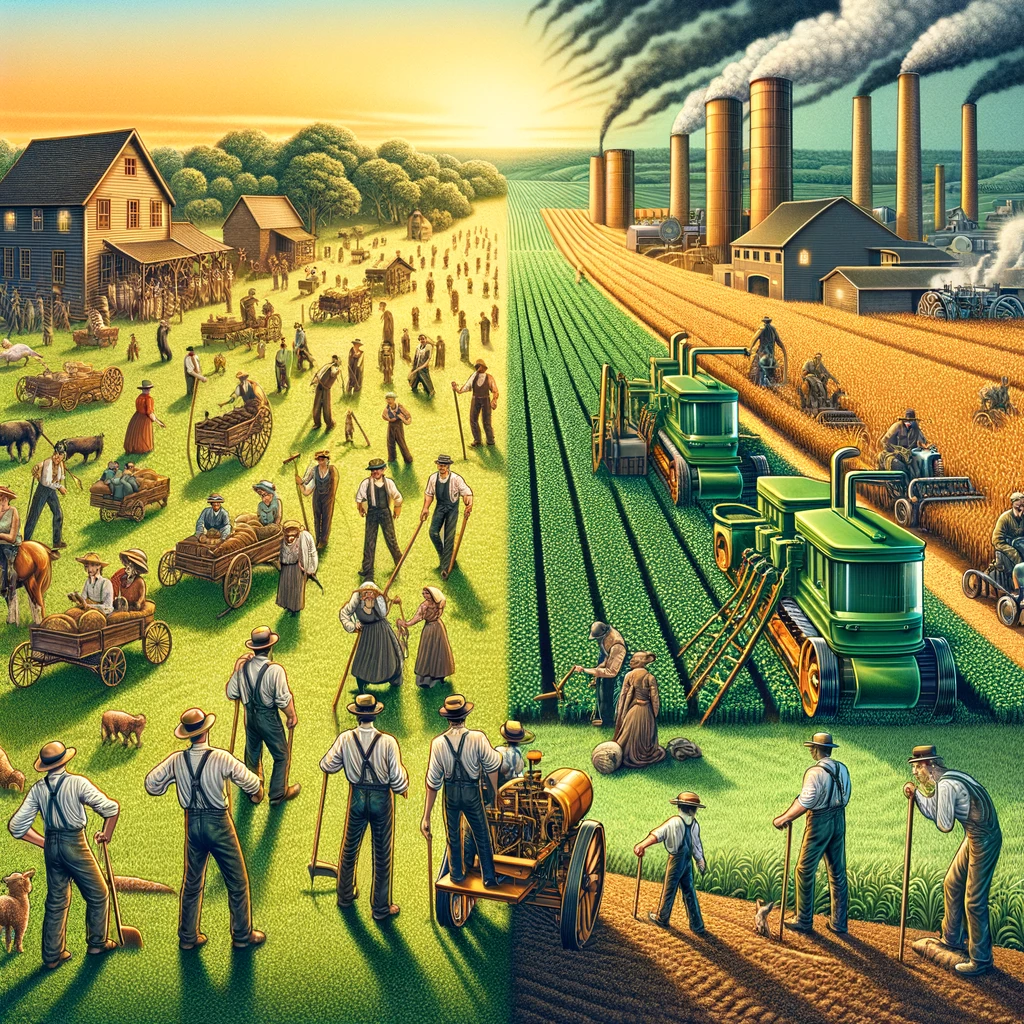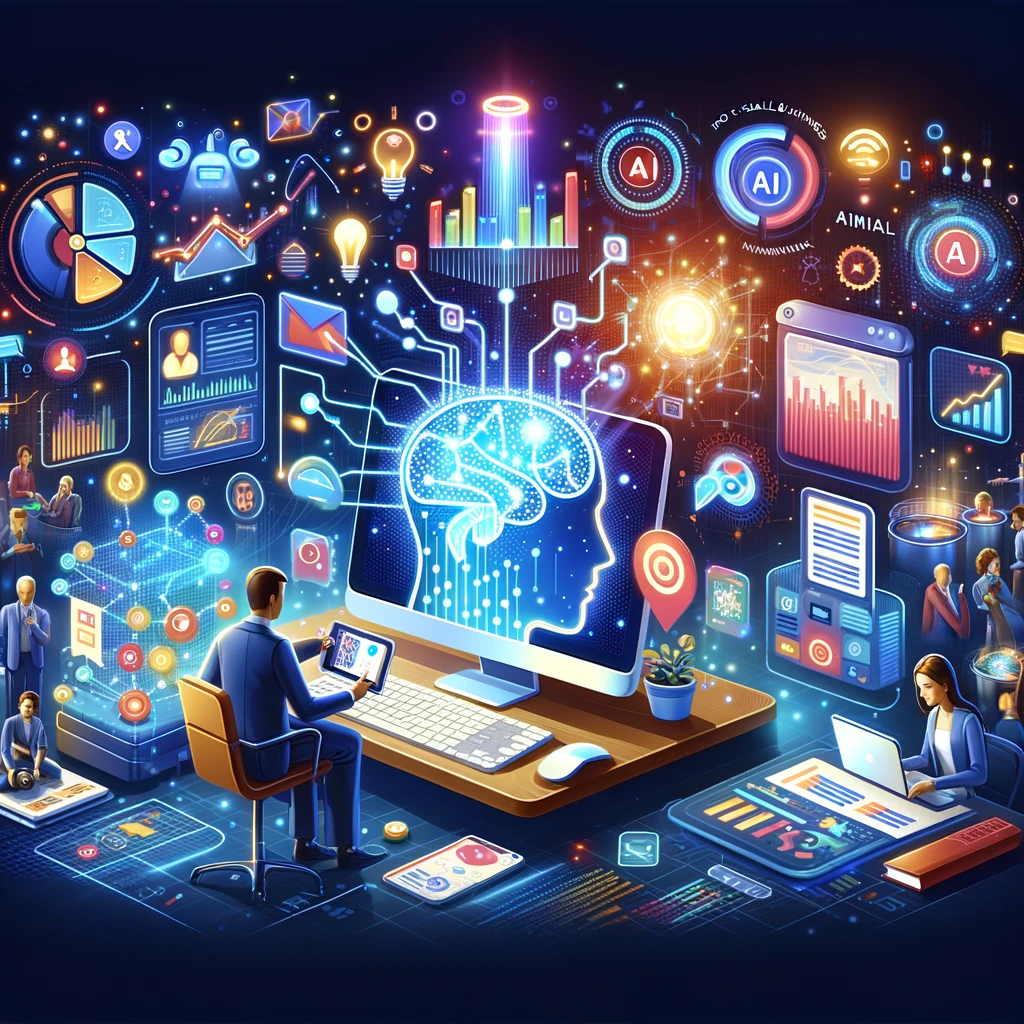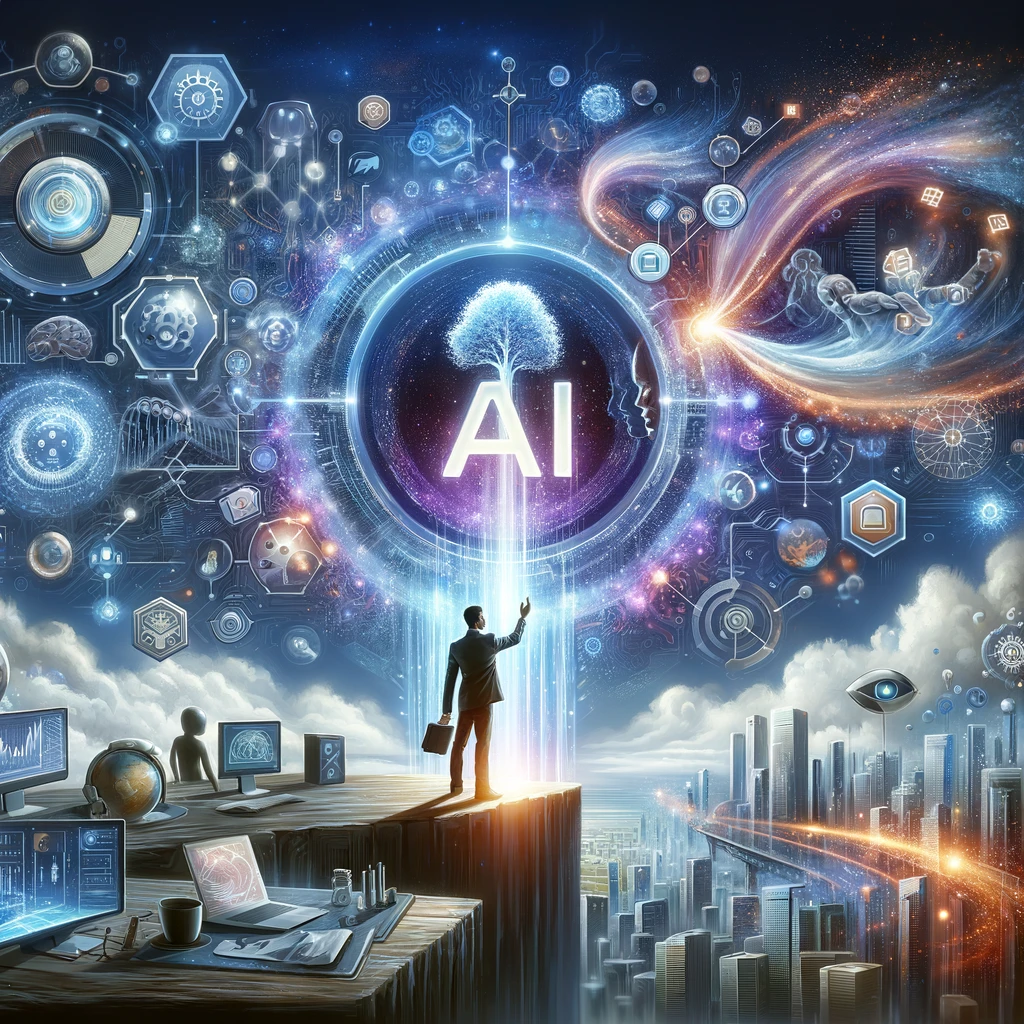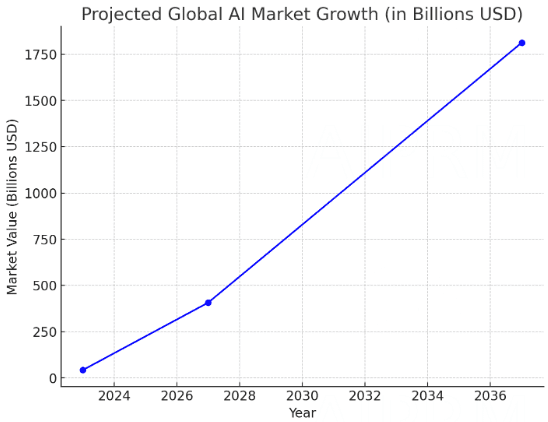Will Robots Steal Your Job? Small Businesses, Big Opportunities
Historical Perspective on Workforce Transformation

The Industrial Revolutin changed the farming and manufaturing industries. AI will do the same for small businesses.
The Agricultural Shift of the 19th Century
Reflecting on history reveals a significant transformation in the workforce and industries. Consider the 1860s: a remarkable 80% of the U.S. population was engaged in agriculture. It’s a striking contrast to today, where merely 2% are involved in farming, yet this small fraction successfully feeds not just the nation but the world.
Technological Advancements and Their Impact
The past centuries have witnessed the remarkable influence of technological advancement. During the Industrial Revolution, the introduction of new technology led to a dramatic shift in agricultural practices. A single farmer equipped with the latest technology could suddenly do the work of 500. This transition, while revolutionary, was not without its challenges. It led to widespread hardship and significant job losses for those who were unable or unwilling to adapt to the new technological landscape.
Positive Outcomes of Technological Change
However, this same period of transformation brought about positive changes too. The technology that brought steam power and advanced machinery, although initially displacing workers, ultimately led to an enhancement in the overall quality of life. It paved the way for the creation of higher-paying jobs and new opportunities in sectors previously unimagined.
The Modern Technological Revolution
The Rise of AI and Automation
Today, we stand on the brink of another similar wave of disruption, this time driven by emerging technologies such as artificial intelligence and automation. Research from Oxford University suggests a startling prediction: nearly half of all American jobs could be automated or replaced in the next two decades. This prospect highlights the critical need for adaptation and the acquisition of new skills in the face of evolving technological landscapes.
Unforeseen Job Opportunities
Looking back a century and a half, it’s fascinating to note that the jobs we take for granted today were once unimaginable. Occupations such as social media marketers, stem cell scientists, and robotics engineers were beyond the realm of possibility. Similarly, the idea that trades like electricians or plumbers could earn upwards of $150,000 annually would have been unthinkable, as would the notion of a factory worker transitioning to program automation for a $100,000 salary.
Embracing Change and New Possibilities
This historical perspective teaches us an important lesson: the inability to foresee future changes does not prevent their occurrence. As we navigate through this era of rapid technological change, it’s crucial to remember that while the future may be uncertain, it is also replete with new opportunities and possibilities.
AI’s Role in Transforming Small Business Digital Marketing

The transformative power of technology in today’s workforce brings automation and opportunity.
AI Revolutionizing Digital Marketing
This historical perspective on technology’s impact on jobs and industries can be closely related to the current role of Artificial Intelligence (AI) in small business digital marketing. Just as the Industrial Revolution brought about significant changes, AI is now revolutionizing digital marketing for small businesses.
Overcoming Limitations with AI
In the past, digital marketing for small businesses was often limited by resources and the need for human input in tasks such as customer segmentation, personalization, and data analysis. Now, with AI, even small businesses can leverage sophisticated algorithms to analyze large datasets, predict customer behaviors, and automate personalized marketing strategies at a scale previously only accessible to larger corporations.
AI Enhancing Productivity and Creating Opportunities
AI tools can optimize marketing campaigns, suggest content strategies based on consumer behavior, and even manage customer service interactions, all with more efficiency and less human oversight. This transformation is akin to the shift from manual farming to mechanized agriculture, where one tool can significantly amplify productivity and output.
Adapting to AI in Marketing
However, just as in the past, this technological shift brings both opportunities and challenges. Small businesses must adapt to integrate AI into their marketing strategies effectively. Those who embrace and understand AI’s potential can gain a competitive edge, enhance customer engagement, and drive growth, much like how embracing industrial machinery led to greater productivity and new job roles.
The Future of AI in Digital Marketing

Capturing the Future of AI in Small Business Digital Marketing.
The Digital Revolution and Its Impact
So, here we are, standing at the crossroads of another monumental shift, much like our predecessors during the Industrial Revolution. But this time, it’s the digital revolution, spearheaded by AI, transforming the landscape of small business digital marketing. It’s a thrilling, albeit challenging time.
AI as a Catalyst for Innovation
Think about it – we’re part of a narrative where technology, once again, is reshaping the world as we know it. AI is not just a tool; it’s a catalyst for innovation, pushing the boundaries of what small businesses can achieve. It’s like having a superpower that can analyze, predict, and personalize at a scale and speed we never thought possible.
The Responsibility and Opportunity of AI
And sure, with great power comes great responsibility. The responsibility to adapt, to learn, and to embrace the change. It’s an invitation to grow, not just for our businesses, but for ourselves too. We’re not just marketing products or services anymore; we’re crafting experiences, building relationships, and making data-driven decisions that seemed like science fiction not too long ago.
A New Era of Possibilities
But here’s the inspiring part – history has shown us that with every major technological shift, humanity has not just adapted but thrived. New jobs, new skills, and new industries have emerged, often better than what we had before. This isn’t the end of an era; it’s the birth of a new one, filled with opportunities we’ve yet to imagine.
Embracing the AI-Driven Digital Marketing Revolution
So, let’s roll up our sleeves and dive in. Let’s be curious, bold, and ready to ride the wave of AI in digital marketing. Because, just like the generations before us, we have the chance to shape the future. And that, my friends, is an adventure worth embarking on.
FAQs
Can small businesses use AI without spending a lot of money?
A: Yes, they can. Small businesses can use AI that works on the internet, like cloud services. These services don’t cost too much. They let you pay only for what you use. Some AI tools are even free to start with. This means small businesses can use AI without a big budget.
What AI tools are easy for a small business to use?
A: Small businesses can start with simple AI tools. Chatbots are like robot helpers that talk to customers on websites. They can answer easy questions. CRM systems with AI help keep track of customer info and can make smart suggestions. These tools are user-friendly and don’t need you to be a tech expert.
How can AI help a small business know more about its customers?
A: AI can study how customers behave and what they like. It looks at data like what they buy and when they buy it. Then, it gives ideas about what customers might want in the future. This helps the business plan better, like deciding what new things to sell or special deals to offer.
What should a small business be careful about when using AI?
A: Small businesses should protect their customers’ private info. They should also check the AI’s advice before making big decisions. AI can make mistakes too. It’s important to keep teaching the workers about AI. This way, they can work well with the new technology.
Can small businesses beat big companies with AI?
A: Yes, AI can be a big help. It lets small businesses do things that usually only big companies can do. AI can handle tasks quickly and learn from all the customer info. This helps small businesses to understand their customers better and make smart choices. So, with AI, small businesses can compete with big ones.


